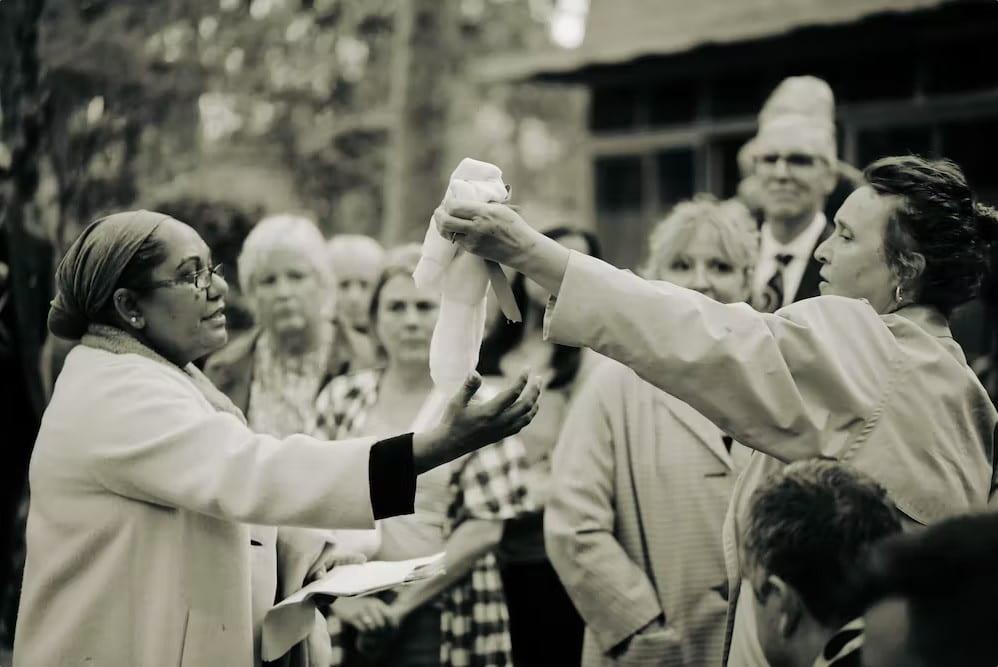The arts have been utilised throughout history to draw attention to important issues in powerful and evocative ways, and will be a prominent feature at UNE’s International Peace Studies Conference from 1-5 December for all to enjoy.
Conference convenor Dr Marty Branagan, UNE Peace Studies, says the arts will enliven and enhance the conference, which this year celebrates 40 years of peace studies at UNE.
“There’s an emerging field of research showing the importance of the arts in a range of areas, including peacebuilding, environmental advocacy, activism, education and community development,” he says. “The arts can influence and be thought-provoking at a range of levels – emotional and physical as well as intellectual. They can convey complex arguments and information in easily understandable forms.”
The program, packed with talks and seminars particularly highlighting the timely topics of climate change activism and the ongoing nuclear threat, includes art-related workshops, a film festival, music performances, art exhibitions, dance performances and the multimedia production ‘Trucked Off’, which highlights the experiences of the Stolen Generations in north-west NSW.
The arts … are able to connect with people in a way that other forms of media can’t. Art, music and song can be interpreted at a personal level which allows people to think about their own place and role in society.
Organiser of the arts program, Dr Alana Blackburn, co-convenor of the University Creative and Cultural Arts Network (UCCAN) at UNE, says an exciting aspect of the program is that it will spill over into events happening across town.
“As well as music at lunchtime from local musicians including guitarist Steve Tafra, UNE’s Paul Smith, local Ezidi music at the conference dinner, art exhibitions and musical performances, and the performance of Trucked Off, we also encourage conference participants to visit local gigs including jazz at the Welder’s Dog pub and the Vivace Folk Festival,” she says.
“There are art exhibitions across the UNE campus in the Oorala Aboriginal Centre, the Library and Arts building, and performances at the Armidale Art Gallery in the mall on Friday night.
“The arts are essential in communicating important messages to the public. They are able to connect with people in a way that other forms of media can’t. Art, music and song can be interpreted at a personal level which allows people to think about their own place and role in society.”
UNE screen studies lecturer Dr Fincina Hopgood, organiser of the Peace Conference Film Festival, says the aim is to highlight a breadth of issues, while being engaging and accessible for a general audience.
“We have selected three documentaries that span issues of local, national, and global importance.
The film festival is a wonderful opportunity to showcase the importance of filmmaking for raising awareness of social issues and telling compelling stories about the peace movement and activism. It’s a great way for the community to engage with the themes and issues of the conference through the power of cinema.
“We are delighted to welcome filmmaker Katherine Aigner, who will introduce her documentary Australian Atomic Confessions about the tragic and long-lasting effects of the atomic weapons testing carried out by Britain in South Australia in the 1950s. Sadly, this film is still relevant today given the ongoing issue of nuclear waste dumps and the Fukushima nuclear disaster in 2011.
“We will also screen Pray the Devil Back to Hell, an uplifting documentary about the women’s peace movement during the civil war in Liberia, which celebrates the impact of women working collectively for peace and their significant contributions to political life in that country. This will be followed by a panel discussion.
“The festival concludes with a documentary closer to home in the Northern Rivers region of New South Wales, The Bentley Effect. Filmed over five years, this multi-award-winning film documents the non-violent blockade and grassroots social movement that rose up to oppose the fracking plans of the gas industry and the State Government.
“Together, these films demonstrate the impact of the peace movement and activism across different contexts.”
“The film festival is a wonderful opportunity to showcase the importance of filmmaking for raising awareness of social issues and telling compelling stories about the peace movement and activism. It’s a great way for the community to engage with the themes and issues of the conference through the power of cinema,” Dr Hopgood says.
While the conference will deal with some confronting issues, Dr Branagan says the arts program particularly aims to inspire people to see that change is possible.
“Despite dealing with major global concerns such as war and global warming, the conference is solutions-oriented and aims to send people away informed, inspired and empowered,” he says. “The arts are a major factor in lifting people’s spirits and couching confronting issues in palatable ways.
“We hope that this conference leaves attendees understanding important issues better and realising the power they have individually and collectively to build peace, sustainability and justice.”
Arts and cultural highlights
| Date and time | Event | Information |
| Friday 2 December, 5pm |
Multimedia performance
‘Trucked Off’ – drama featuring oral histories of the Stolen Generations from north-west NSW (Dr Lorina Barker) |
Oorala Aboriginal Centre, UNE Armidale |
| Friday 2 December, 7pm |
Art exhibition and performances
Music by MC and the Squares. Indian dance performance. |
Armidale Art Gallery, Beardy Street Mall. |
| Sunday 4 December, from 2pm |
Peace Conference Film Festival
|
Belgrave Cinema
Tickets at the door (cash only): $10 per film (free for conference delegates and UNE students) |
Also happening:
- Jazz at the Welder’s Dog – Thursday 1 December, 8pm. Visit the Facebook page.
- The Vivace Folk Festival – 3 December, Armidale Showground. Find out more.
To view the full peace conference program and find out more, visit the website.
Image: Dr Lorina Barker (left) in her immersive theatre work, Trucked Off. Photo: Ray Bud Kelly Jnr.



Recent Comments